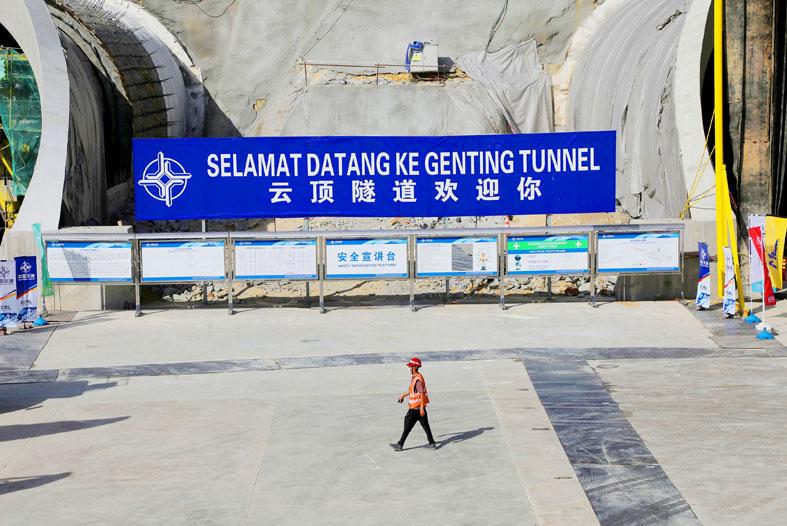China’s finance and investment spending in Belt and Road Initiative countries fell slightly in the first half compared with a year earlier, with no new coal projects and investments in Russia, Egypt and Sri Lanka falling to zero, new research published on Sunday showed.
Saudi Arabia was the biggest recipient of Chinese investments over the period, with about US$5.5 billion, the Shanghai-based Green Finance and Development Center (GFDC) research showed.
Total financing and investment stood at US$28.4 billion over the period, down from US$29.6 billion a year earlier, bringing total cumulative Belt and Road spending to US$932 billion since 2013, GFDC said.

Photo: Reuters
Chinese President Xi Jinping (習近平) launched the Belt and Road Initiative in 2013 aiming to harness China’s strengths in financing and infrastructure construction to “build a broad community of shared interests” throughout Asia, Africa and Latin America.
It has come under scrutiny for the debt burden it places on countries and other issues such as environmental degradation. Some countries have also renegotiated their investment projects with China, highlighting the debt risks.
No new coal projects received Chinese support over the period after a pledge made at the UN General Assembly by Xi in September last year to put an end to overseas coal financing.
However, a Chinese developer won a bid to build a thermal power plant in Indonesia in February, and there are still 11.2 gigawatts of capacity that have already secured financing, but are yet to begin construction, said GFDC, part of Shanghai’s Fudan University.
China has continued to provide support to other fossil fuel projects in Belt and Road countries, with oil and gas amounting to about 80 percent of China’s overseas energy investments and 66 percent of its construction contracts, GFDC said.
Engagements in gas projects stood at US$6.7 billion in the first half, compared with US$9.5 billion over the whole of last year, it said.
Green energy and hydropower transactions fell 22 percent from a year earlier. Investment rose to US$1.4 billion from US$400 million, but green energy-related construction spending fell to US$1.6 billion, less than half the level a year earlier.

UNCERTAINTY: Innolux activated a stringent supply chain management mechanism, as it did during the COVID-19 pandemic, to ensure optimal inventory levels for customers Flat-panel display makers AUO Corp (友達) and Innolux Corp (群創) yesterday said that about 12 to 20 percent of their display business is at risk of potential US tariffs and that they would relocate production or shipment destinations to mitigate the levies’ effects. US tariffs would have a direct impact of US$200 million on AUO’s revenue, company chairman Paul Peng (彭雙浪) told reporters on the sidelines of the Touch Taiwan trade show in Taipei yesterday. That would make up about 12 percent of the company’s overall revenue. To cope with the tariff uncertainty, AUO plans to allocate its production to manufacturing facilities in

Taiwan will prioritize the development of silicon photonics by taking advantage of its strength in the semiconductor industry to build another shield to protect the local economy, National Development Council (NDC) Minister Paul Liu (劉鏡清) said yesterday. Speaking at a meeting of the legislature’s Economics Committee, Liu said Taiwan already has the artificial intelligence (AI) industry as a shield, after the semiconductor industry, to safeguard the country, and is looking at new unique fields to build more economic shields. While Taiwan will further strengthen its existing shields, over the longer term, the country is determined to focus on such potential segments as

COLLABORATION: Given Taiwan’s key position in global supply chains, the US firm is discussing strategies with local partners and clients to deal with global uncertainties Advanced Micro Devices Inc (AMD) yesterday said it is meeting with local ecosystem partners, including Taiwan Semiconductor Manufacturing Co (TSMC, 台積電), to discuss strategies, including long-term manufacturing, to navigate uncertainties such as US tariffs, as Taiwan occupies an important position in global supply chains. AMD chief executive officer Lisa Su (蘇姿丰) told reporters that Taiwan is an important part of the chip designer’s ecosystem and she is discussing with partners and customers in Taiwan to forge strong collaborations on different areas during this critical period. AMD has just become the first artificial-intelligence (AI) server chip customer of TSMC to utilize its advanced

While China’s leaders use their economic and political might to fight US President Donald Trump’s trade war “to the end,” its army of social media soldiers are embarking on a more humorous campaign online. Trump’s tariff blitz has seen Washington and Beijing impose eye-watering duties on imports from the other, fanning a standoff between the economic superpowers that has sparked global recession fears and sent markets into a tailspin. Trump says his policy is a response to years of being “ripped off” by other countries and aims to bring manufacturing to the US, forcing companies to employ US workers. However, China’s online warriors